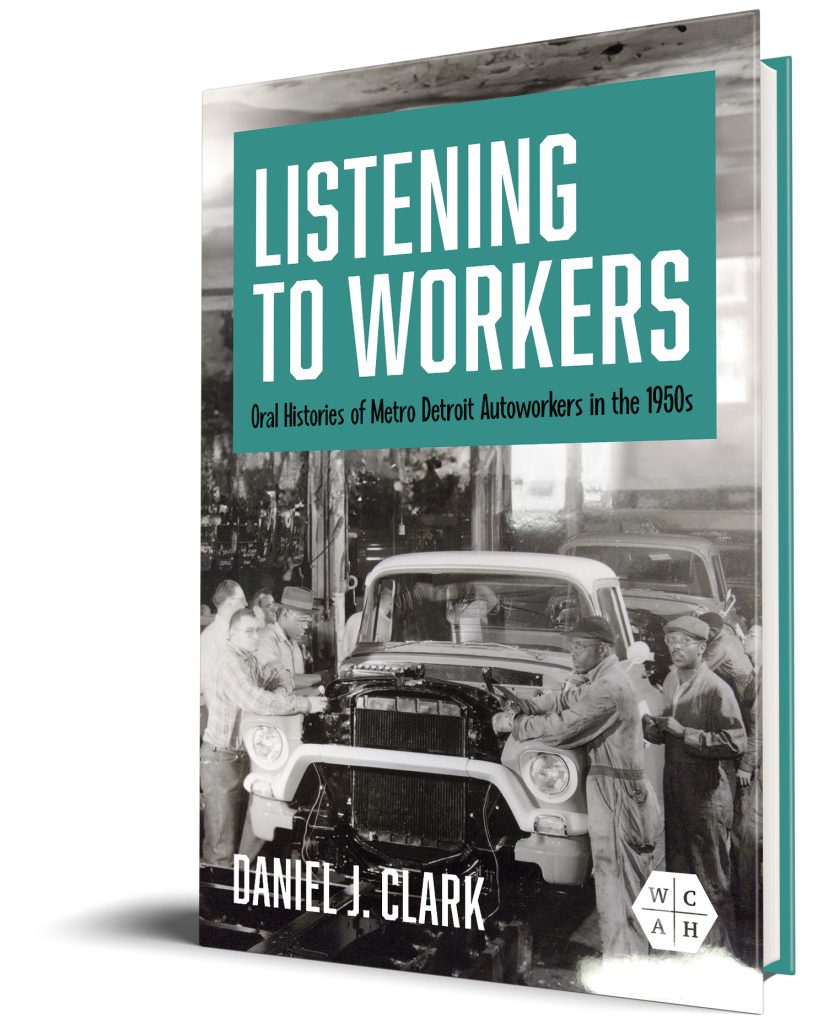Daniel J. Clark, author of Listening to Workers: Oral Histories of Metro Detroit Autoworkers in the 1950s, answers questions on his new book.
Q: Why did you decide to write this book?
The idea for this book came to me when I got a tenure-track job at Oakland University, in suburban Detroit. I had recently completed my first book, Like Night and Day: Unionization in a Southern Mill Town, which began with oral history interviews of former textile mill workers. I was interested in doing more oral history and discovered that little had been written about ordinary autoworkers in Detroit. So that was my entry point. I wanted to learn about the experiences of ordinary autoworkers, not necessarily activists or leaders, and I was particularly interested in the 1950s, what has been considered the heyday of the auto industry and the United Auto Workers union. That project took a turn when I discovered, contrary to expectations, that most autoworkers experienced the 1950s as a decade of job instability and economic insecurity. I pursued that theme and the result was a book I didn’t expect to write, Disruption in Detroit: Autoworkers and the Elusive Postwar Boom. Listening to Workers is much closer to the original vision of my oral history project, a book based on life history narratives of ordinary workers.
Q: What is the most interesting discovery you made while researching and writing your book?
The first most interesting discovery was that these autoworkers had very unstable working lives and were only “autoworkers” about half of the time during the supposed glory days of the 1950s. Beyond that, the most interesting discovery happened over and over again, with different details, as I learned about the experiences of the people I interviewed. No matter what generalizations you might think are accurate about a group of people, listening to them tell stories about their lives will defy any such assumptions.
Q: What myths do you hope your book will dispel or what do you hope your book will help readers unlearn?
For the most part, autoworkers in the 1950s are viewed as having entered the middle class through lucrative contracts negotiated by the UAW. Most scholars concede that this did not generally happen for Black autoworkers, but the myth remains, and has become solidified as income inequality increases and so many jobs today do not provide a living wage or adequate benefits. Ordinary autoworkers in the early post-WWII period have been seen mainly through the prism of UAW politics—were they for or against the bargaining agenda of UAW president Walter Reuther?—or as comfortable beneficiaries of the postwar economic boom. Listening to Workers demonstrates that neither of these frameworks has much to offer when considering the actual experiences, hopes, and dreams of ordinary autoworkers.
Q: Which part of the publishing process did you find the most interesting?
This is my third book, so I’m used to the process, but the most interesting part has always been the feedback from anonymous reviewers of the manuscript. When you put your hard-earned research and worried-over prose out there for consideration, you never know what will come back. I always appreciate how that feedback makes me think, rethink, consider, sometimes concede, and sometimes hold my ground. It’s really helpful.
Q: What is your advice to scholars/authors who want to take on a similar project?
Be patient, and have faith. Oral history takes a lot of time. Life responsibilities will get in the way of research projects, and most of them are probably more important than research projects—unless you’re on the tenure clock!
Q: What do you like to read/watch/or listen to for fun?
I like to read history, in fields far from my own. That’s what drew me to the field in the first place and where I return when I get a chance and enough mental space. But I also love to binge watch TV series, usually behind the curve based on recommendations from friends.

Daniel J. Clark is a professor of history at Oakland University. He is the author of Disruption in Detroit: Autoworkers and the Elusive Postwar Boom.

